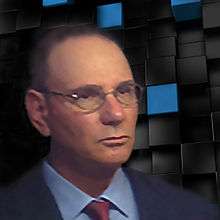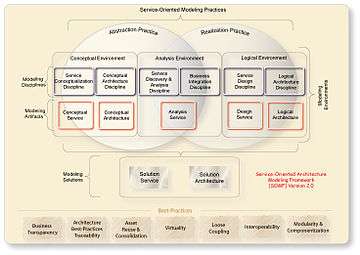Michael B.T. Bell
| Michael B.T. Bell | |
|---|---|
 | |
| Nationality | American |
| Alma mater | City University of New York |
| Occupation | Enterprise Architect |
Michael B.T. Bell is an American enterprise software architect, chiefly recognized for developing the Service-oriented modeling framework (SOMF)[1][2][3][4][5] and the cloud computing modeling notation (CCMN).[6] His innovative research and publications in the fields of software architecture, service-oriented architecture, model-driven engineering, cloud computing, and big data are recognized internationally for their contribution to the software design and development communities.
Biography
Bell earned his computer science master’s degree in 1992 from the City University of New York (CUNY).
After graduation, as a software developer and enterprise architect consultant, he dedicated his career to improving business and technological operations of financial institutions in Wall Street. He developed innovative software algorithms and methodologies for high-volume Electronic trading platforms. This included modules for execution of trading applications, persistence methods for large volumes of data, and design of high-speed network and internet software implementations.
He has worked for J.P. Morgan Chase, Citibank, UBS-Paine Webber, Deutsche Bank, American Express, TD Waterhouse, Pfizer, AIG, and Prudential.
Bell’s Service-Oriented Modeling Methodology

In 2008 Bell introduced the Service-oriented modeling framework (SOMF) [7][8] to the software development community in his book Service-Oriented Modeling.[9]
The service framework, driven by Discipline-specific modeling, was devised to encourage consolidation of software assets, reduction of systems redundancy, and acceleration of time-to-market. SOMF [10] includes a modeling language and a life cycle methodology (see image on the far right) suited for narrowing the gap between the business and the information technology organizations in the enterprise.
The framework also includes modeling disciplines and practices of software systems, for the purpose of designing software applications. Furthermore, SOMF [11] offers a variety of architectural styles, such as enterprise architecture, application architecture, service-oriented architecture,[12] and cloud computing.
Publications
Michael Bell has published several books and articles. The following is a selection:
- 2005. "An Organizational Model: The AOM-3, Architecture Organization Structure and Role Models". IP Publishing. ISBN 978-0-9896935-3-0
- 2006. "Service-Oriented Architecture: A Planning and Implementation Guide for Business and Technology". With Eric Marks. Wiley & Sons. ISBN 978-0471768944
- 2008. "Service-Oriented Modeling: Service Analysis, Design, and Architecture". Wiley & Sons. ISBN 978-0470141113
- 2010. "SOA Modeling Patterns for Service Oriented Discovery and Analysis". Wiley & Sons. ISBN 978-0470481974
- 2011. Service Oriented Modeling Specifications for SOMF. Includes Service design and cloud computing.
- 2016. "Incremental Software Architecture: A Method for Saving Failing IT Implementations" . Wiley & Sons. ISBN 978-1119117643
References
- ↑ Bell, Michael (2008). "Introduction to Service-Oriented Modeling". Service-Oriented Modeling: Service Analysis, Design, and Architecture. Wiley & Sons. ISBN 978-0-470-14111-3.
- ↑ Thuraisingham, Bhavani (2010). Secure Semantic Service-Oriented Systems. CRC Press. pp. 42,43,152,153. ISBN 9781420073324.
- ↑ Hybertson, Duane (2012). Model-oriented Systems Engineering Science: A Unifying Framework for Traditional and Complex Systems (Complex and Enterprise Systems Engineering). Auerbach Publication. pp. 256, 329. ISBN 978-1420072518.
- ↑ Thuraisingham, Bhavani (2013). Developing and Securing the Cloud. CRC Press. p. 87. ISBN 9781439862919.
- ↑ Buyya, Rugkumar (2013). Mastering Cloud Computing. Tata McGraw-Hill. pp. 2–30. ISBN 9781259029950.
- ↑ "Cloud Computing Modeling Notation". Sparx Systems.
- ↑ Sosinsky, Barrie (2010). Cloud Computing Bible. Wiley & Sons. pp. 288,289. ISBN 9781118023990.
- ↑ Trujillo, Juan (2010). Advances in Conceptual Modeling – Applications and Challenges. Springer Science & Business Media. pp. 87,88. ISBN 9783642163845.
- ↑ Bell, Michael. "Service-Oriented Modeling". Wiley & Sons.
- ↑ Dustdar, Schahram (2010). Service Engineering: European Research Results. Springer Science & Business Media. pp. 112,xi. ISBN 9783709104156.
- ↑ Bell, Michael (2009). SOA Modeling Patterns for Service Oriented Discovery and Analysis. Wiley & Sons. pp. 185,240. ISBN 9780470579695.
- ↑ Bell, Michael. "Service-Oriented Architecture". Wiley & Sons.
External links
- "SOMF Examples & Language Notation" (Softcopy). Michael Bell/Methodologies Corporation.
- "Interview with Michael Bell about Cloud Computing Modeling Notation" (Softcopy). tknowledgeexchange.techtarget.com online publishing.
- "State University of Arizona: Service-Oriented Modeling Framework (SOMF) studies and research" (Softcopy). Arizona State University.
- "Service-Oriented Architecture strategies video" (Softcopy). Michael Bell.
- "Service-Oriented and Cloud Computing SOMF Modeling Tools" (Softcopy). Sparx Systems.
- "Service-Oriented and Cloud Computing SOMF Modeling Solutions" (Softcopy). CEPHAS Corporation.